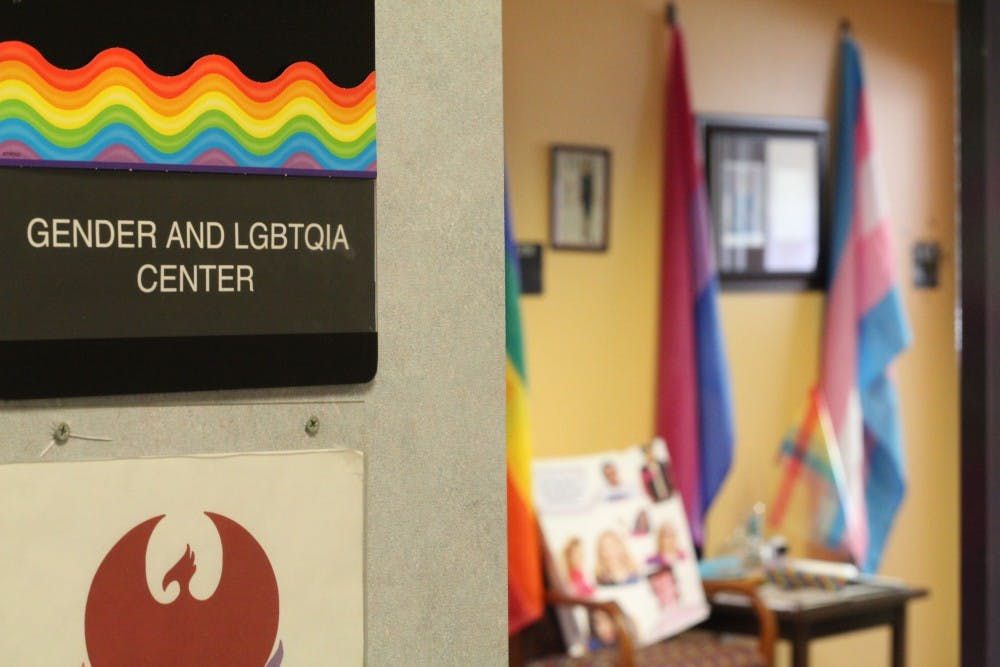Snug in the corner of second floor Moseley, a three-roomed, brightly colored office bedecked with rainbows celebrates its second birthday this year.
But don’t underestimate the office, Elon University’s Gender and LGBTQIA Center (GLC), for its age.
After two years of programming, policy changing and community building, it was announced Monday that the GLC placed 15th in a nationwide study ranking LGBTQIA-friendly campuses.
Elon’s center received 4.5 out of five stars and ranked No. 1 in the South.
The GLC leapt over 350 schools since its last ranking (370th), sending a bold message to college campuses: things can happen quickly with community support on all levels.
To place in the Top 25 listing in the Campus Pride Index, an institution had to score the highest percentages in the LGBTQIA-friendly benchmarks — a checklist of practices, policies and opportunities that set LGBTQIA students up for optimal success. The listing this year includes public and private universities with student populations ranging from 1,600 to over 50,000.
A unified voice
When Matthew Antonio Bosch, the only hired-staff member of the GLC, began his tenure at Elon in Spring 2013, LGBTQIA initiatives at Elon were scattered.
The decision to keep Chick-fil-A on campus despite its CEO’s openness to anti-LGBT rights had been sparking debate throughout campus. Elon had earned only 2.5 out of 5 stars in its Campus Pride Index that year. The President’s LGBTQIA task-force had only just been launched. No formal LGBTQIA programming existed in one office space.
“I think what lacked the most was a unified voice,” Bosch said. “There was no one person to go up to and ask, ‘Hey, why does this matter?’”
That’s where Bosch’s role filled the gap. Making the GLC’s prescence known from fraternity and sorority life, to athletics to residence life and even the application process, Bosch strived to engage many areas of campus in dialogue on LGBTQIA-related topics.
On several occasions, that meant standing in front of Elon’s head coaches in the athletic deparment and discussing topics that Bosch said a few were uncomfortable with.
“I would be talking to some people who had never even thought about LGBTQIA identities and concerns in their department before,” he said. “But they would ask questions and engage thoroughly in the discussion — even if they were red in the face throughout much of the process.”
Many students — including junior Sophie Natan, president of Spectrum — credit Bosch’s eagerness to bring LGBTQIA discussion into classrooms, office spaces and residence halls, to much of Elon’s advancements in LGBTQIA inclusivity.
“Bosch has completely overhauled how Elon administration approaches Gender and LGBTQIA topics,” Natan said. “He uses his kindness, quiet influence and infectious happiness to educate a wide range of organizations on campus.”
Joelle Halle, a junior at Elon, can attest to this. Though she has only met Bosch on one occasion — a discussion on LGBTQIA-friendly reporting which he led in one of her communications class — he left a lasting impression.
“He kept my attention from the minute he walked into our class until the minute he left,” she said. “I know that if I ever had any questions about the LGBTQIA community, I could go to him without hesitation or fear of judgement and he would be thrilled to answer my questions.”
Through continued efforts from the GLC, Inclusive Community Council and Spectrum — to name a few active organizations — and members of the overall faculty, staff, and student body, today Elon is one of only 12 schools that gives prospective students the option to self-identify on applications. Seventy universal bathrooms can be found all over campus. Athletes participating on intramural sports teams can play with the gender they identify with.
Current students and alumni can change gender markers and names on transcripts and diplomas. Individuals with different gender identities can live together in several residential spaces including Oaks and Colonnades.
LGBTQIA-identifying seniors now look forward to the third Lavender Graduation, an annual scholarship and graduation ceremony. More than 10 nationally acclaimed speakers have hosted campus-wide discussions on LGBTQIA rights. And the list of advancments just keeps growing.
Thousands of rainbow-colored ‘bELONg’ pins later, Bosch finds it difficult to explain the momentum on campus.
“I really can’t explain it,” he said. “I think a lot of it connects to national discussions on LGBTQIA rights, responses to violent acts in the region and increased visibility. It caused all this dialogue and — in many ways — led to how fast things could be changed and introduced at Elon.”
Natan said she was estatic about the new ranking but not surprised.
“Many people have put hard work into changing attitudes around Elon,” she said. “And I’ve never been more proud to be an Elon student during a time of such growth.”
With 3.5 percent of the incoming class identifying as part of the LGBTQIA community and with the many individuals and allies not reported in that statistic, Natan is excited for future progress at Elon and hopes that Spectrum will continue playing a role in serving as a place where anyone, regardless of identity and background, can feel welcome, safe and heard.
“Regardless of this achievement, I recognize that progress regarding diversity and intersectionality of identities at Elon can not stop now, ” Natan said. “And because of people like Matthew Antonio, it won’t.”


